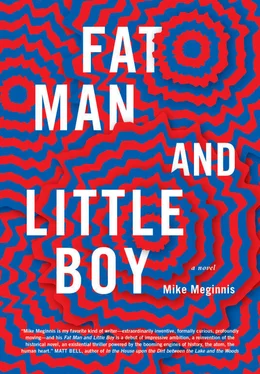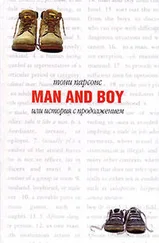“When I come back tomorrow morning, maybe you’ll have made a good decision.”
He takes a hat from the rack on his way out. A black hat with a wide brim. He closes the door. Now Little Boy’s alone with her. He hears her shifting in the sheets.
It turns cold. He stays still, feeling his soft shell all around him like a cathedral, echoing with him. As long as he’s back on the floor when Fat Man returns it will be like he never moved.
He finds his feet and climbs up in the bed. His body is small again. He wraps himself in the blanket with the woman. In doing so he pulls a little from her, revealing naked arms and the drape of her shirt. The tops of her arms bristle with grass. There is a mass beneath her shirt as well, more grass. Out of her shirt’s torn collar, a growing flower winds toward the ceiling. The blossom blooms. Red petals like ruby quartz. Her eyes are open. She’s looking at the flower. He can only assume she sees. Leaves budding, and thorns. Not a rose. Clover on the collar bone.
Fat Man finds her that way the next morning. Still alive. He prunes the flower, trims the grass, and pulls loose the bloodied-red roots where he can. Little Boy’s on the floor the way he was left. Still awake, becoming a cathedral.
What a little boy needs is a mother. What a fat man wants is a wife. What a homeless woman needs is a home. What this one needs is a warm place to die. What this one needs is a bath and a bed.
One night Fat Man bathes her.
One night she dies.
Does not become a mother or a wife.
No queen, but a body.
The brothers watch, transfixed, as her body becomes hair. Becomes mold. Becomes maggots. Becomes bones. Becomes spiders. Becomes flowers.
Becomes a seed.
See the brothers through the secret cabin’s thick blue window like a square of still water. See the strange light she casts on the brothers. See the way they watch her. See the way their hair stands on end. See that Little Boy is sitting up: sitting like a little boy.
See how calm their bodies. The slow and steady of their breathing.
As if there is some weight, some heat, leaving them.
It goes dark.
In the dark they are whispering. The cabin’s door opens.
Glints of motion. Sound of shoes on thin grass and bald mud.
The ease of digging in soft earth, even for such a large seed.
What a seed wants is a hole.
Little Boy helps his brother make the hole.
A seed wants a place to grow.
Wakahisa Masumi, the Oriental spirit medium, combs his hair. It hangs halfway down his back; the ends make him itch. He parts it down the center, a pink-white line dividing oil-slick tresses. The comb is jade, carved to look like it was made from tortoise shell, with little pearls set in the handle. They look soft but dig into the palm, leaving small red blisters with extended use. Using his fingernails, he plucks the short black curling hairs from his nose’s prim cartilage and flicks them into the trash. Flutters his eyelashes: geisha, geisha. He gazes at the mirror, imagining a wife. Her lips and cheeks would be a little pinker, and her forehead would be smooth and calm as cream. She would feel like the underside of his wrist—the silk of the skin. Otherwise, there might be a strong resemblance. He was always a delicate boy, and quiet. Now he is beautiful too. He unwinds the loose hairs from the teeth of his comb, spooling them around his fingers. It feels cool. He lays down the comb and sets the coil beside it, among others in various stages of tangle and curl. He shaves the hints of mustache from his lip, using a straight razor and scented lather. His skin burns pleasantly.
There is a dead girl seated on the empty air beside him, plucking her eyebrows thinner and thinner. A bra hangs from her shoulders, unbuckled in the back, cups veiling only the tips of her nipples, the bruise-colored aureole setting suns above the lacy fringe. Her yellow high-heel shoes hang from up-curled toes, back ends bobbing. She watches herself in the mirror, checking her teeth and stroking her hair intermittently as she grooms. Her image is not in the mirror.
Masumi checks his teeth as well. He does up his hair in a tight ridge that climbs the crown of his skull like a centipede. When he puts on his hat he looks and feels a man again—feels his balls descend a little, feels his prick unfurl. The hat is white with a brown band, some kind of leather, perhaps calf skin—he doesn’t remember. It has dimples on its sides. He flicks it askew. What a charmer. He drinks the lukewarm dregs of his flask, a peppermint schnapps, and sets it on the vanity. There is another half-finished bottle, whiskey, that he decants into the flask through a dented brass funnel he considers an old friend. The schnapps cost him too much, and the whiskey was worse. He’ll have to win it all back.
As he stands up from the chair before the vanity, the dead girl slides horizontally into his place without seeming to notice, passing through the armrest, coming to rest in his chair. She plucks and plucks her eyebrows, bobs her heels, checks her dead girl teeth. The mirror does not see her, will not countenance her face.
Masumi sits on the bed to put on his shoes. There’s a dead boy hiding underneath, peeking at his ankles. The dead boy doesn’t wear a shirt and there’s a dark pit in his throat where sound would leak if he really made any—that is, if he still used air for words. Masumi has not asked him where the hole came from or why he doesn’t cover it. That’s where his audience would go first. He prides himself on avoiding the obvious. In this case that doesn’t leave a lot to discuss. The boy fingers the edges of his absences—the wound, the gums of his missing teeth—incessantly.
Masumi puts his head between his knees to see the dead boy, who grins up at him, gap-toothed.
“Hello Charlie.”
“Hello,” says the dead boy, sniggering. “Do you feel well today?”
“I’m hung over, and I’ve got an itch.”
“What kinda itch?”
“The same kind I’ve had for months now,” says Masumi. “The kind you can’t reach. I’m going down to the casino. Don’t wait up for me.”
“If you see my parents,” says the dead boy, and then he trails off. He wouldn’t know what to do about it if he found them.
Masumi scratches the back of his head. He has, in fact, two itches. There is the ghost of a submarine that floats just above and just behind him. There is also the pull of the bombs, which manifests itself in his right temple. The submarine is silent. He has never seen it, only feels its judgment as it wavers pale and ominous, watching him. It follows as he buzzes the elevator and hovers behind him as he waits in the hall. The submarine has become a sort of comfort. The bombs are something different. He doesn’t want to think about them.
There is a dead elevator boy in a hotel uniform. His black fingers pass through the door as he reaches to slide it open. The white, living elevator boy welcomes Masumi inside. “Hello sir,” he says. Masumi nods. The dead elevator boy stands beside the living one, pulling an invisible crank as the living one pulls his. Masumi ignores the dead one. They want to be seen. They are prone to acting out.
Masumi lights a cigarette. Watches the smoke. Lets it build in his throat until it seeps out his nostrils. There must be a line in a poem somewhere about the way a pack can make you a dragon for a day. The living elevator boy coughs pointedly. The dead one doesn’t mind at all.
Perhaps the best part of playing the casino is that no one pays Masumi any mind. He can sit at the slots unmolested, pulling the lever when he feels he wants to pull the lever and handling his coins when he doesn’t want to do anything. He sucks on them as well, pressing the cool, greasy metal to the inside of his cheek. He can shoot craps, or he can play roulette. No one asks about dead relatives, or looks to him for guidance. Nobody meets his eyes, even. Perhaps they are afraid. Western wartime propaganda emphasized his culture’s strange admixture of industry and savagery. They may be waiting for him to play a koto or eat from the end of a ritual knife. Or they may, to be more generous, only dislike the way he looks around a room, observing the death in all things: the ghosts among the crowd. He unscrews the cap on his flask, pours his boozy concoction in his half-full Coca-Cola. The remaining flecks of ice unsettle, pushed to the perimeter of the glass, and tilt from side to side. He stirs with his straw, takes a sip. Bittersweet.
Читать дальше












